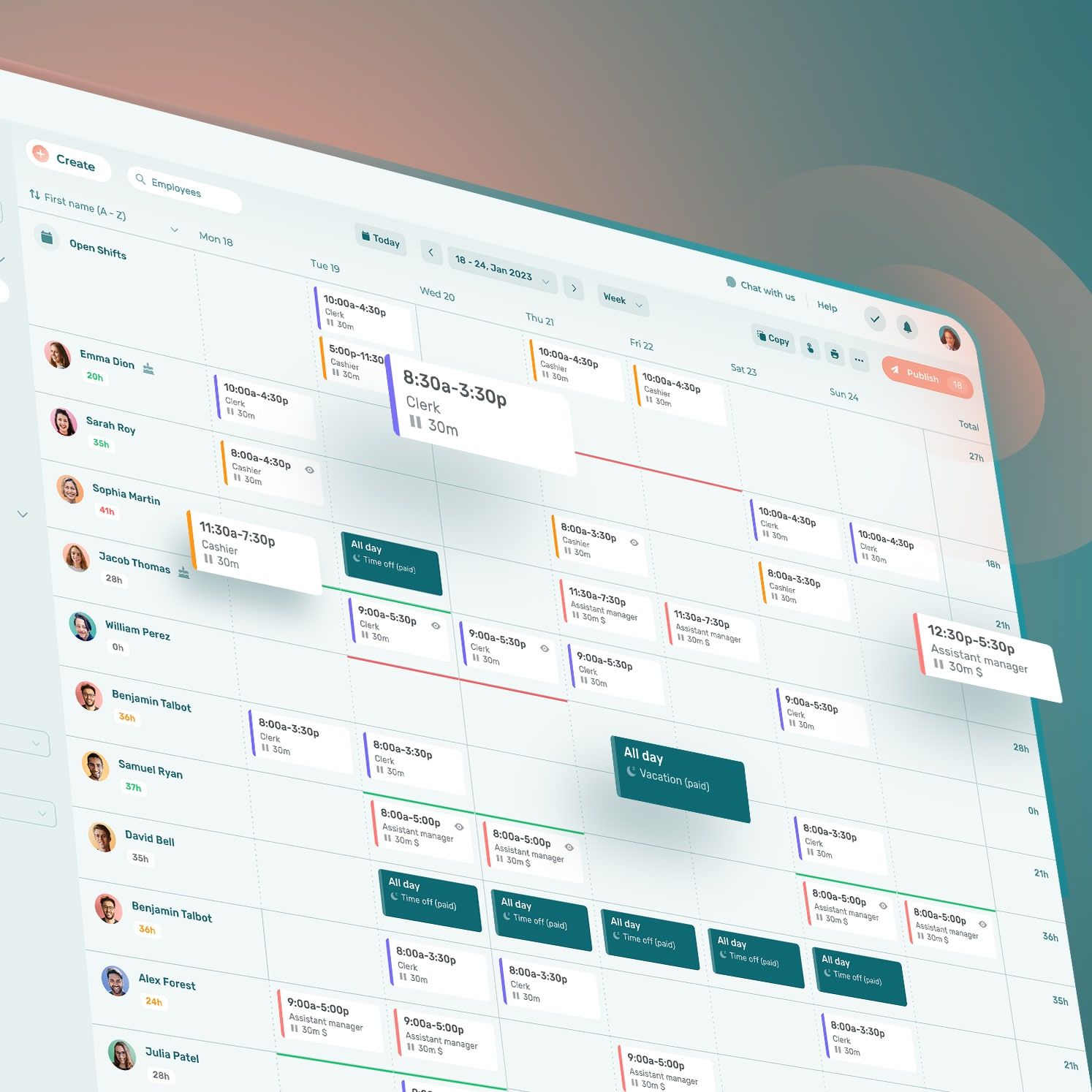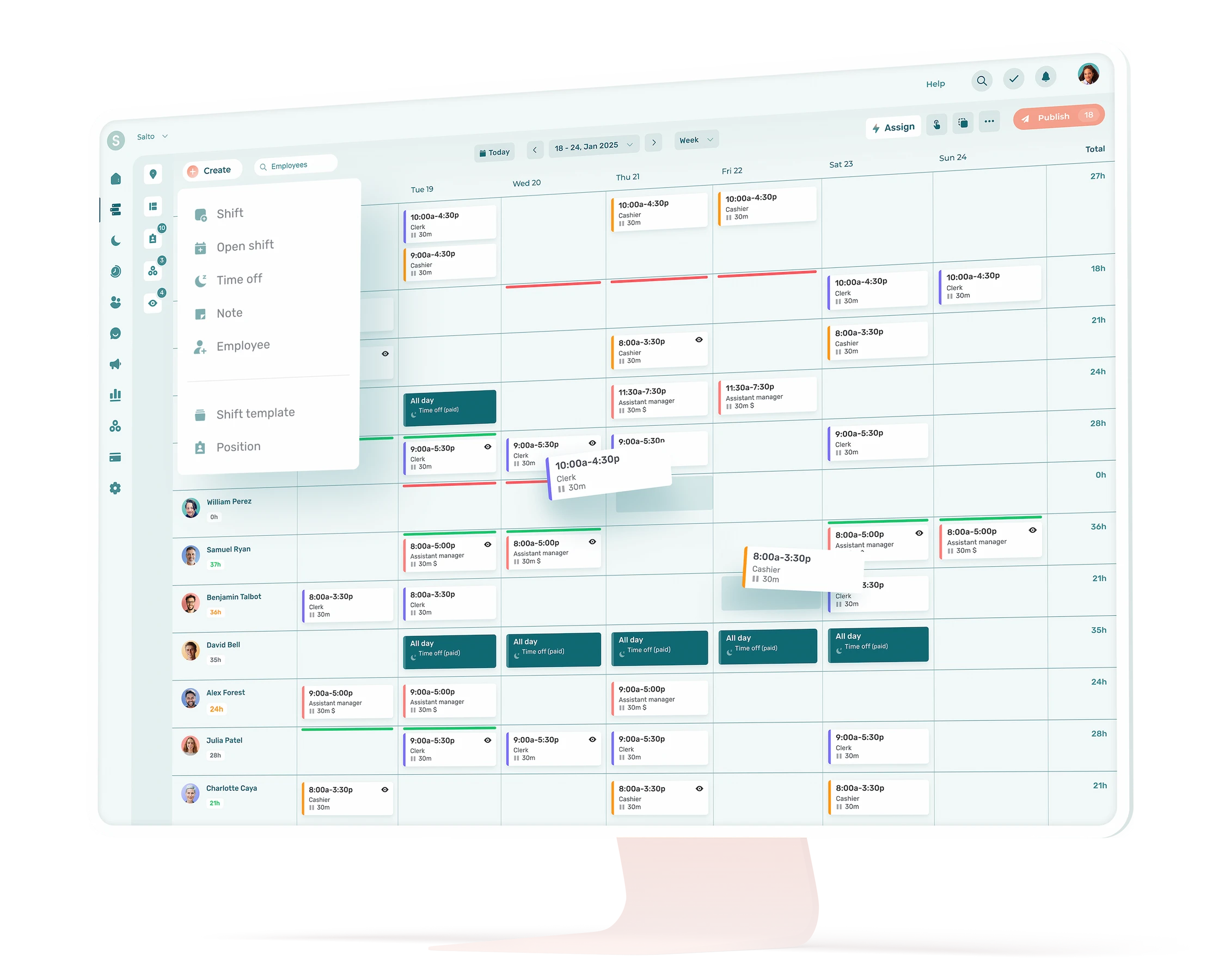A whopping 80% of employees consider flexible work arrangements as a deciding factor when considering job offers. At the same time, 85% of businesses report an increase in productivity levels after introducing flexible work schedules.
These numbers are significant, and reflect the changing world of work. In 2024, flex schedules should be the norm and not the exception.
In this article, we’ll examine how working flexible hours leads to better work–life balance for your team, and how to implement it for maximum rewards. Let’s dive in.
What Is a Flex Schedule?
A flex schedule is when employees are able to choose their work hours. They’re not tied to working 9–5pm, five days a week.
With flexible work schedules, employees have the opportunity to live a more balanced life, without blurring the lines between personal life and work.
Now, this doesn’t necessarily translate to having full control over your day and coming to the office whenever you feel like it. There’s still a structure to it, depending on how your workplace operates.
Lack of Flexibility at Work: Potential Issues
The benefits of workplace flexibility are numerous. And without it, both businesses and employees can suffer.
1. Poor Work–Life Balance
A lack of flexibility at work can lead to a poor work–life balance. That means employees may be unable to prioritize commitments outside of work.
Since work time is fixed and unchanging, employees have to build their lives to suit their work schedules. This leads to the next issue.
2. A Decline in Employee Engagement and Dissatisfaction
With a fixed work schedule, employees don’t have the option of compressing their work between Monday and Thursday so they can take a long weekend for a family getaway.
Neither can they split their tasks between morning and night to show up at their child’s soccer game at noon. With these restrictions, employee dissatisfaction can set in, leading to a decline in engagement and issues like absenteeism.
And employee engagement has a massive knock-on effect. With improvements to employee engagement, global analytics and advice firm Gallup observed an 81% decrease in absenteeism.
3. Loss of Quality Talent
Many companies now add remote or hybrid work, and flexible hours as a perk on their job description. If you don’t follow suit, you may lose quality talent and struggle to attract new hires.
Benefits of Flexible Hours for Employees

Now that you’ve been introduced to the problems associated with a lack of workplace flexibility, let’s review the benefits flexibility brings.
1. It Helps to Prevent Burnout
Working five days a week, month in and out, without any wiggle room, can cause stress. And without room for work flexibility, employees run the risk of burning out.
In its recent survey of 10,243 workers across the US, Australia, France, Germany, Japan, and the UK, Future Forum Pulse observed a strong correlation between rates of employee burnout and a lack of flexibility.
Of those surveyed, 53% who were dissatisfied with their level of flexibility said they were burned out. Conversely, 37% of employees who were satisfied with their level of flexibility reported burnout.
And finally, employees with no flexibility in their schedules were 26% more likely to report burnout than those with a moderate degree of flexibility.
While burnout appears to remain an issue, with a flexible work schedule, employees can pace their work and rest in between tasks to prevent burnout.
2. It Enhances Work–Life Balance
Many employees prioritize a healthy work–life balance, allowing them to make a decent living and still show up for their loved ones.
With a flexible work schedule, employees can make time for things that matter to them outside of work.
And that has a knock-on effect. A recent study by the International Labor Organization reveals that flexible hours benefit both work–life balance and employee productivity. It’s a win-win.
3. It Heightens Job Satisfaction
With a flexible work schedule, many employees are more satisfied with their jobs and are likely to carry out their tasks to the best of their abilities.
It’s confirmed by research, too. This 2020 study concluded that flexible work leads to higher job satisfaction and lower levels of burnout and stress.
Benefits for Employers

While it may seem like a flexible work schedule mostly benefits employees, employers can also reap numerous rewards. Here are some examples.
1. It Helps Attract the Best Talent
Employees these days prioritize work–life balance above money and employee benefits combined. This was one of the key findings of a 2022 study by CIPHR.
So, including a flexible work schedule as a perk in your job descriptions can help you attract the best talent.
This is borne out in recruitment trends too. A reported 30% of recruiters say that advertising roles with flexible working has helped them attract the best talent.
Can’t offer telework? Here are other ways your organization can offer flexible work options to your employees.
2. It Improves Employee Happiness and Retention
As many as 76% of employees will stay longer at flexible companies, and 61% have either resigned or considered quitting due to inflexibility at work.
By implementing a flexible work schedule, your employees are likely to be happier, more satisfied with their work, and more committed to staying at your company for as long as possible.
Is Your Company Flexible Enough for Flex Schedules?

By nature, some companies will always be able to offer their employees more flexible work hours than others.
At these companies, there’s no need to schedule a doctor’s appointment in advance or feel guilty about missing a day of work because of a sick child; the hours are simply made up as soon as possible, and that’s that.
But in service businesses that must contend with time constraints—such as restaurants and retail stores—or in a health or caregiving setting like in clinics, and nursing homes, unexpected absences are not so easy to manage.
That being said, less flexibility does not mean no flexibility at all. No matter what your situation, it is possible to give back some power to your team members.
Here are some types of companies most suitable for a flex schedule:
- Fintech companies
- Marketing agencies
- Information technology companies
- Recruitment and human resources companies
- Educational technology companies
- Cybersecurity companies
4 Types of Flex Work Schedules
Here are four types of flex work schedules you can adopt in your workplace.

1. Flex Time
Flex time is a flexible work schedule that allows employees to choose the hours of the day they will work, while still filling their usual 40-hour weekly quota.
Here, employees can decide to work from afternoon till night, to enable them to attend to personal commitments in the morning; or work a split shift starting in the morning, then take a pause in the afternoon, and resume work in the evening.
However, with flex time, some workplaces may require employees to be available at certain hours of the day so they can collaborate with other team members.
2. Compressed Work
With a compressed work schedule, working hours can be compressed into some days, and employees can take days off.
For example, instead of working five, eight-hour days, an employee can decide to compress it into four, ten-hour days and take an additional day off.
3. Remote Work
With remote work, employees have the flexibility to work from anywhere in the world, so long as the work gets done on time.
While remote work isn’t necessarily a form of flex hours, it can add to overall flexibility, especially if remote workers aren’t expected to work according to a set timezone.
4. Part-Time
This is a work schedule where one typically works for half the usual time, freeing up time to attend to other engagements such as another part-time job, studies, and more.
With part-time work, employees have space to pursue other commitments. They only receive payment for the number of hours worked, as agreed between them and their employer.
Potential Legal and Compliance Issues and Their Solutions
Since flexible schedules are fairly new in the world of work, there aren’t comprehensive rules on navigating them.
But flexible schedules have a significant impact on the way work is done, so you need policies in place to protect both employers and employees.
Here are some potential legal and compliance issues that may occur along the way, as well as solutions you can implement.
1. Tracking Hours and Output

One of the issues that can occur with flex schedules is tracking the number of hours worked by employees, to ensure maximum output and productivity.
In situations like this, make sure your timekeeping procedures are clear and accepted by employees. Using solutions like Agendrix, you can also track the number of hours worked, to ensure accuracy and more efficient payroll.
2. Benefits Compliance
In an ideal work environment, employees are entitled to benefits like PTO, health insurance, pension plans, wellness programs, and more. A flex schedule should then not be used as an excuse to forego these.
However, if there is a need to, it’s better to discuss with employees, and ask if they will prefer to forego other benefits and opt for a flex schedule instead.
3. Criteria for Vetting Flex Schedule Requests
If your company’s flex schedule is based on individual requests and isn’t rolled out company-wide, they’ll need to be vetted consistently across the board, and according to clear guidelines to ensure fair and equitable treatment.
How to Implement a Flex Schedule in Your Company: Best Practices

Implementing a flexible schedule requires you to prepare ahead. This will ensure a smooth transition without losing work output.
Not only is this good for the organization, but it’ll also help employees plan and adjust to this new style of working.
Here are some best practices to follow for optimal results.
1. Train Managers in Advance
For many managers and team leads, a flexible schedule can be difficult to navigate—especially if they have no prior experience with it. It’s important to empower them with the tools and processes to make their work easier. An employee scheduling tool like Agendrix will help here.
Work with your managers on setting clear expectations with teams, and prepare them to navigate employee feedback.
2. Do a Dry Run
After getting buy-in from managers and other top executives, you should then do a dry run. This may mean rolling out flexible schedules one department at a time, before adopting it company-wide.
This will show you how things will pan out if a flex schedule is implemented. It also gives you space to correct potential issues detected during the trial period.
3. Communicate the Policy Clearly
After agreeing to implement a flex schedule, and then trialling the selected schedule type, it’s time to communicate the policy to your employees. Ensure you also include an outline of the policy and how it will work in your employee handbook and other important documents.
This serves as a reference in situations where the policy is being abused and as a guide in situations of confusion.
4. Use Cross-Communication Tools

To succeed with a flexible work schedule, use cross-communication tools that centralize communications between team members who may be using different tools, and be scattered across different regions, and time zones.
With a messenger functionality built into its schedule tracking software, Agendrix makes it easy to discuss flex schedule options for team members and share schedule updates instantly.
5. Allow Employees to Swap Shifts
Part-time workers should be allowed to swap shifts with one another, as suits them. This helps them to work more convenient shifts and not be tied to a strict work schedule. The option to choose when they work helps support better work–life balance.
6. Ask Your Employees What They Would Prefer
To run a flexible schedule well, ask your employees how they’d prefer work to be scheduled.
This is key because everyone’s personal life differs. While flex hours may work well for someone, another person may prefer compressed hours.
7. Consider a Rotating Schedule
Following that, you can also implement a rotating work schedule to spread out any less enjoyable shifts amongst your team.
Flex Schedule Examples
Here are some examples of different kinds of flex schedules you can adopt in your company.
Example 1
Instead of working a strict five-day, eight-hour work week, workers can work for 10 hours in four days and get one extra day in the week off.
Example 2
Instead of working a strict 9am–5pm schedule, workers can decide to work flexible hours from 9am–2pm, take a break from 2–5pm, and then work from 5–8pm.
Example 3
Another example is working a specific schedule for an extended period, say working from 10am–6pm from February to April, then switching to 8am–4pm from May to July, and more.
Example 4
Another example is a schedule that differs based on the day of the week.
For example, working from home from Mondays to Wednesdays, then working at the office on Thursdays and Fridays. This could be working from 10am–6pm on Mondays to Thursdays, and working from 7am–3pm on Fridays.
Conclusion
Not everyone on your team will be a great flexible worker. Some individuals may find structured hours easier to manage. Still, that doesn’t take flexible work off the table.
The best way to handle this is to put guidelines in place. Have a policy regarding the flex schedule, set clear expectations about work, communicate clearly, and be firm when slacking occurs.
With Agendrix, you can track and schedule employee work to ensure maximum productivity, while promoting work–life balance. Start your free trial today!
What Is Flex Time at Work?
Flex time is a work schedule that allows you to pick the time you start and end work, depending on what works for you. With flex time, you still need to complete the normal hours of work per week, however, you can set your own schedule each day.
How Do You Make a Flex Schedule?
To make a flex schedule, decide on the type your company will operate for employees to choose from, which could be flex time, compressed work, part-time, etc. With an employee scheduling software like Agendrix, you can easily plan and share schedules, visualize and track employee’s daily work structure, and track worked hours.











